Matt's Roof Garden
Powered by 🌱Roam GardenRead
productivity + creativity is about mind management, not [[time management]] (a #[Twitter thread])
"There's only 24 hours in a day," people say. What they think that means: You should get as much as you can from each of those hours. What that actually means: Time management is squeezing blood from a stone. There's a limit to the time you can save.
We're entering the Creative Age. According to @kaifulee, AI and automation are poised to take forty- to fifty-percent of jobs in the next couple decades. But not all jobs will disappear at the same rate. Jobs that require creativity that will be out of reach for AI.
We know thanks to the work of neuroscientists @JohnKounios & Mark Beeman that insightful thinking is a unique type of thinking:
promoted by positive mood & relaxation
a fragile state: hard to get into, easy to get out of
Here's what an "aha" moment looks like.
A great idea doesn't mean your idea is ready to ship. There are four stages of creativity:
Preparation: Learn about the problem
Incubation: Let it sink in
Illumination: Have the idea
Verification: Get it ready to ship
Respect these stages, don't get blocked. ****
Not all hours are equal. Some hours are great for having ideas – other hours are great for executing on those ideas.
@danariely and I noticed working on Timeful (Google acq'd.) there aren't 24 hours in the day – there's an hour here or there for each type of thinking. ****
Here's what the late, great, Anders Ericsson saw when he looked at the practice schedules of the very best violinists. Intense practice in the morning. Sporadic practice the rest of the day.
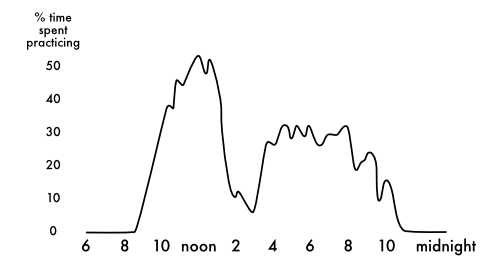
You can work with cycles in your world to propel your ideas forward. Days, weeks, seasons, and years can be harnessed to cycle through the Four Stages of Creativity. Some examples
{{table}}
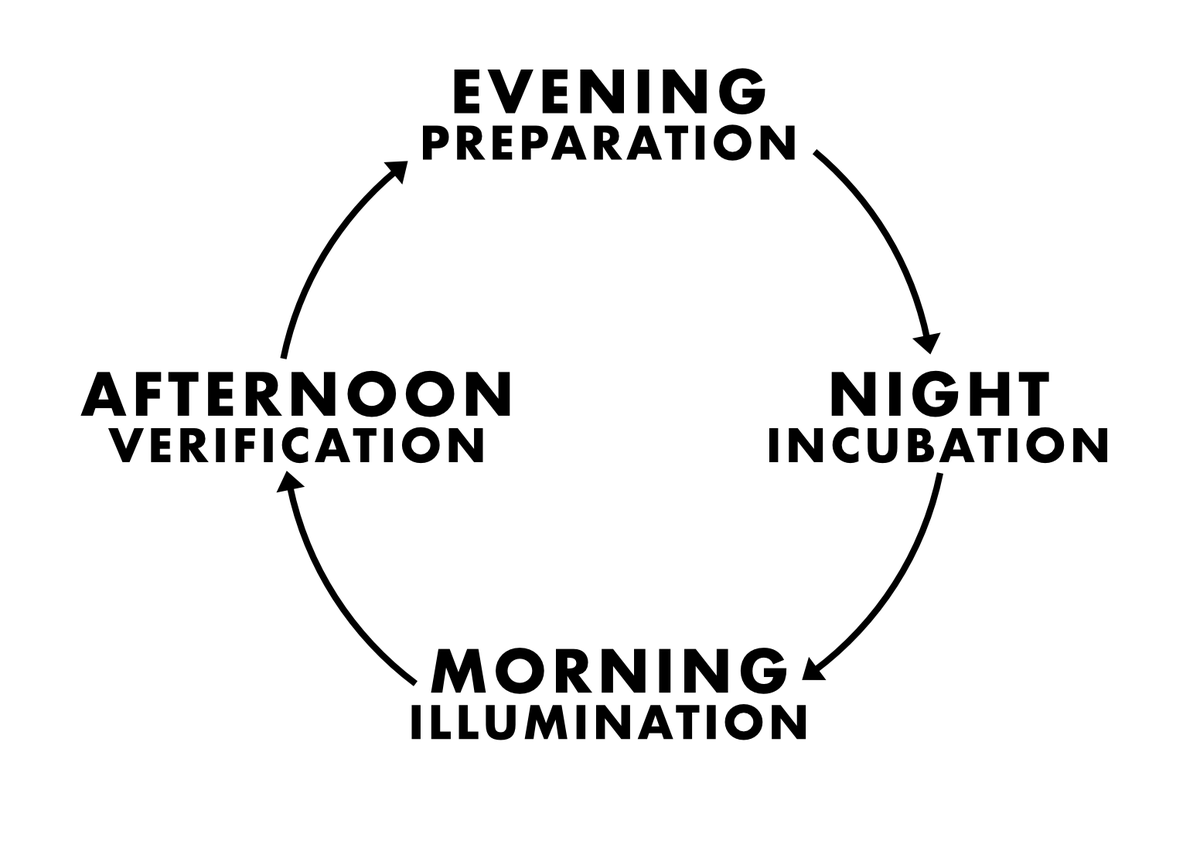
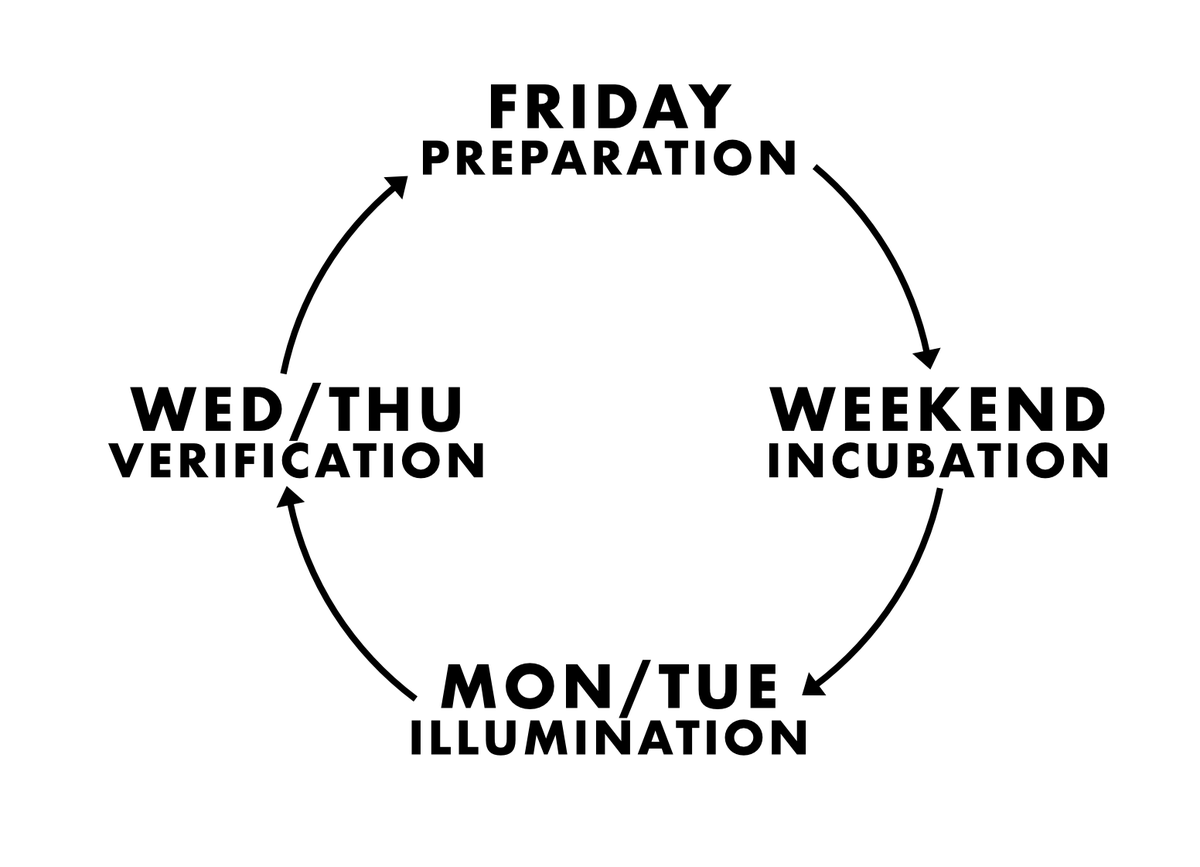
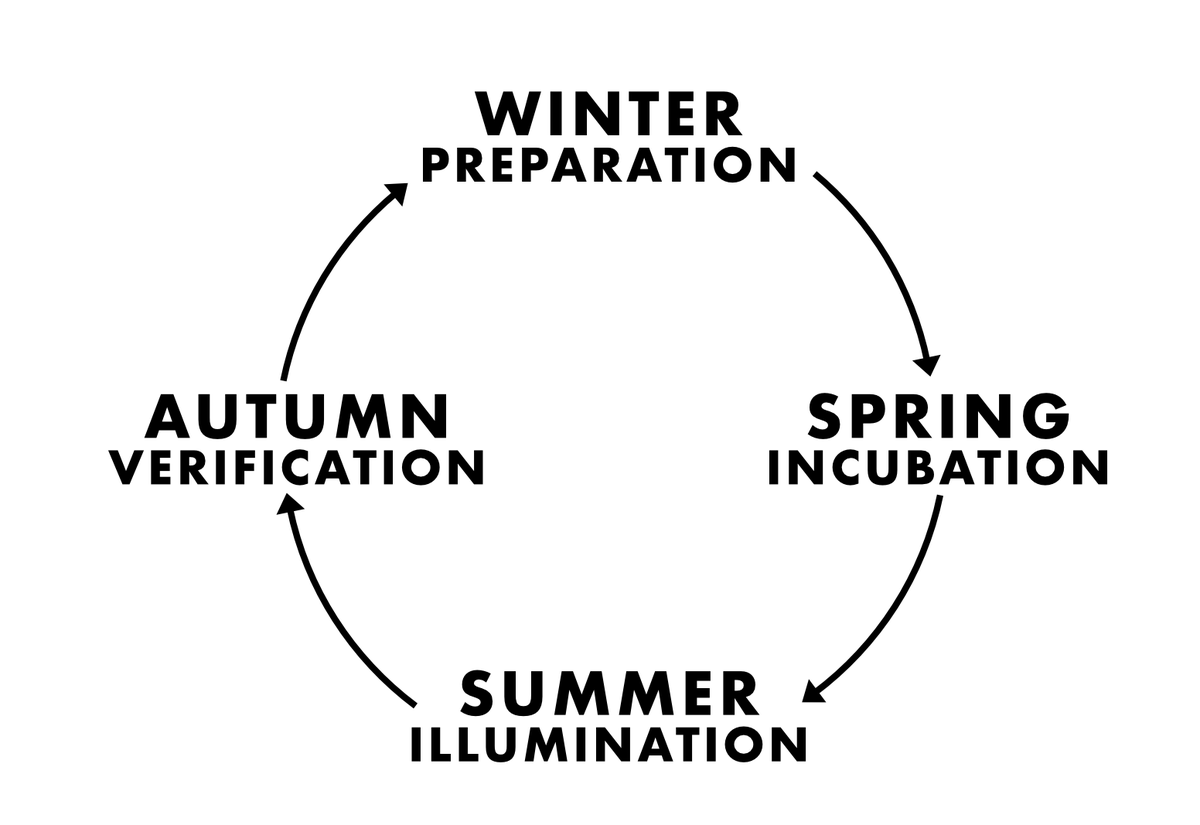
Creative work is best tackled by mental state.
I've identified seven mental states of creative work, and I organize my week by those states. Like this:

Instead of cramming work into time, work according to stages of creative thinking, and mental state. I have systems I've built to go through these stages and ride the waves of my mental state.
Here's how I work on my podcast, throughout the year, the month, the week:
{{table}}

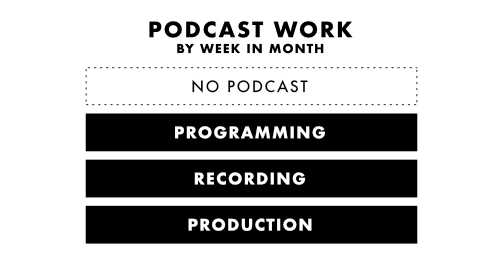

Organize tasks not by project but by mental state. Who cares what project the task is in? What matters is you're mentally able to do the task.
Here's what my labels and tasks look like in @todoist
{{table}}
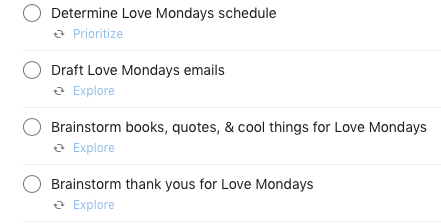
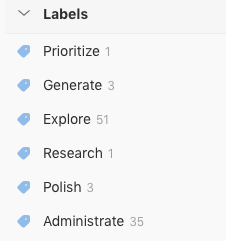
The systems I use to produce my podcast, my weekly newsletter, and write books, make special use of incubation. What used to be an hour-long, grueling task, is now spaced into three 5-minute bursts. Incubation does the work for me.
In a chaotic world, your systems have to be antifragile. When you work according to mental state and have the right slack in your systems, chaos doesn't throw you off-balance. Instead, chaos presents creative opportunities: Ideas you can store for when you need them.
If you want to know more, read my book, Book/Mind Management, Not Time Management. It's a decade in the making and it will show you how to be productive when creativity matters. It launches today! 🔗
If you enjoyed this thread, check out my latest tweet storm: How to do your best thinking when you're not thinking...
How to do your best thinking when you're not thinking. (a #[Twitter thread] productivity
As I mentioned in a previous tweet storm, there are four stages to creativity:
Think of Incubation as your "Passive Genius." It works while you do other things. It even works while you sleep. Folk wisdom knows if you have a tough decision you should "sleep on it," but how often do we intentionally use this magic to our advantage?
There are three main things your Passive Genius does for you:
Memory consolidation
Fixation forgetting
Subconscious processing (controversial)
Imagine I give you some information:
Tom is taller than Jill
Jill is taller than Jerry
Then you take a nap... When you woke up, you'd magically know more about this information. If I asked: Is Tom taller than Jerry? you would answer faster. I didn't tell you Tom is taller than Jerry. It's implied. Tom is taller than Jill – and Jill is taller than Jerry. This is "relational memory"
Relational memory is critical to solving creative problems. If you're: designing a useable interface, writing a suspenseful mystery novel, choreographing a dance... You make trade-offs & decide what to include or keep out. You need a deep understanding of the source material.
This is probably why when Meredith Monk choreographs and composes a performance, she draws charts. It helps her process how the elements of the piece interact. (h/t @masoncurrey )
{{table}}


Your “Passive Genius” improves relational memory while you sleep.
Remember that Preparation comes before Incubation which comes before Illumination. Before you can have your "aha" moment, you need the contours of the problem space in your mind. Relational memory helps.
The second way your Passive Genius helps you solve problems is through "fixation forgetting." Let's try a benchmark creativity test called a Remote Associates Test. Can you think of one word that goes with each of these three words?
cream
skate
water
...The answer is "ice." Ice cream, ice skate, ice water.
Let's try a tougher one:
pine
crab
sauce.
Let's look at how you might solve that problem... You start by thinking of words that go with "pine." The first word you think of is "tree." You test "tree" with the other words. Would "crabtree" count? Next, you try "tree sauce." That doesn't work. "Tree" is a dead-end.
The answer is "apple." It seems obvious! Why was it so hard?
“Tree” is strongly associated with “pine”. So strongly that once you thought of tree, you couldn’t think of other words that go with pine. With so many potential connections in the problem space, you got blocked. You were fixated on the wrong connection.
{{table}}



If you had had time away from the problem, you would have had a better chance of solving it because you would have forgotten the "bad idea" of "tree." This is called fixation forgetting. It's the 2nd way your Passive Genius does your best thinking when you're not thinking.
The third way your Passive Genius may think for your is through subconscious processing. Even when you aren't actively thinking, there's a lot of brain activity going on. This is called the "default mode network." This FMRI shows brain activity in a resting brain...
Research *suggests* your subconscious mind actually solves problems for you. I believe it, but I default to @JohnKounios on the science. According to John, the research isn't conclusive. It's hard to isolate subconscious processing as a cause of problem solving.
A fourth (bonus!) way your Passive Genius solves problems for you is when you're actively thinking about things while doing other things. Such as in the shower or while doing chores.
Now, here’s one way I use Passive Genius to make work easier... When I write show notes for a podcast interview, I need to know what the conversation was *about*. This is harder than it sounds. Seth Godin has just blown my mind for an hour, and now I need to pull out the lessons. I used to hate this task. I'd sit at my computer and listen to the episode while taking notes. I'd have to re-listen to parts over and over. It was a real slog. Now, I load the raw audio file into @Overcast, and listen to it while I do low-load tasks – such as showering, doing dishes, or walking. @nireyal calls this "multichannel multitasking." ****
This part is counterintuitive: I listen to the audio three different times. These listens are spaced out by a day or more. That gives my Passive Genius time to work on it while I do other things. By the time I write the intro, most of the work is done – and I did it while doing other things!
1st time, at 1x speed: I pay no attention, take no notes.
2nd time, at 2x speed: If something pops out, I stop what I'm doing & take a note.
3rd time, at 3x speed. Is there's anything I missed?
My Passive Genius identified the sound patterns so I could listen faster, and the good ideas stuck with me while I forgot the rest. ****
If you want to know more about how to use the power of incubation to move your projects forward, I have a book for that. Over here 🔗